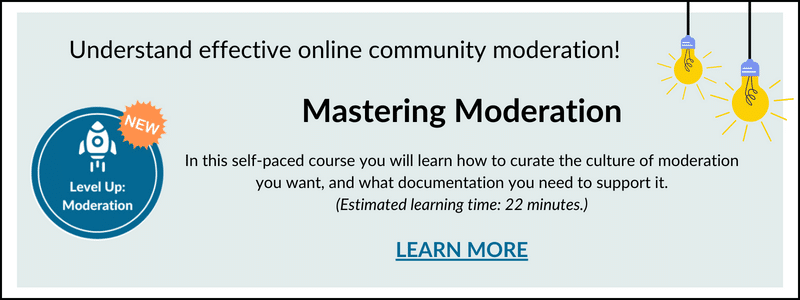
For anyone who manages or moderates an online community, you know that sustaining a positive tone can sometimes be a challenge. Members view it as a safe place to provide feedback, vent their frustrations, and have their voice be heard. It’s not always pretty.
In a past life, I managed a large external support community. Given the nature of the subject matter and the rapid growth from a couple thousand to well over 100,000 members three years later, the tone early on wasn’t exactly a positive one. However, thanks to some savvy community peers and a long-term strategy, we were able to turn it around.
I’ve outlined three lessons I learned in the process that will help you keep your community helpful and not hostile.
1. Establish clear guidelines for participation.
This doesn’t just mean create a list of things users aren’t permitted to do. While you will want to include a list of prohibited behavior, more importantly, focus on sharing with users the behavior and participation they can do to contribute, add value and benefit. No one enjoys being told what not to do. Instead, show your membership how they can contribute and engage productively. Post a question. Answer a question. Give kudos and acknowledge good contributions from others. (Here’s another post with an example of good guidelines for participation.)
2. Demonstrate the tone you want members to mimic.
I’ve seen all too many examples of online communities where the members go rogue. The engagement, content and tone are nothing like what the brand originally intended. Often times this happens because the forum or group doesn’t have a community moderator. I would never recommend starting an online community, forum or group without moderation. Users tend to mimic the tone they experience so if you’re starting a new community be sure to “seed” the community with appropriately toned content prior to launch. If you’re coming into an established community that needs help with tone, in addition to reviewing and cleaning up toxic content be sure to create positive content and feature this content when possible. Be sure to acknowledge and recognize members who contribute the types of responses that mimic the tone you are trying to establish.
3. Firmly and consistently enforce the participation guidelines.
I mentioned earlier the need to establish clear guidelines for participation at the start. Equally important is fair and consistent enforcement of the guidelines. If you have a member going off the rails and you don’t guide them back in, then not only might that member continue to veer off the desired path but that behavior is being witnessed by other members who may see the conduct as acceptable. Community members tend to mimic the behavior they see. The sooner you rein in the offender the less chance you’ll have of others following suit.
Diligently following these three recommendations will help you create and maintain the welcoming, supportive environment online communities strive for. Remember to define appropriate participation, mimic the desired behavior and be consistent with enforcement of the guidelines.

